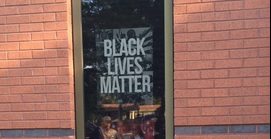U.S. Immigration Defense Lawyer Raha Jorjani writes in Washington Post: “Could black people in the U.S. qualify as refugees?” Raha Jorjani makes the case that such persecution of identity groups would justify others who came to America as protected refugees. It is a powerful and important argument that human rights activists in America and around the world need to hear and understand. Our support for the Universal Declaration of Human Rights is not simply for foreign nations, but it is for all nations, including the United States of America. We cannot ignore such the epidemic of identity group persecution in America and believe we are doing good for human rights in the world.
Raha Jorjani writes in Washington Post:
“Suppose a client walked into my office and told me that police officers in his country had choked a man to death over a petty crime. Suppose he said police fatally shot another man in the back as he ran away. That they arrested a woman during a traffic stop and placed her in jail, where she died three days later. That a 12-year-old boy in his country was shot and killed by the police as he played in the park.
Suppose he told me that all of those victims were from the same ethnic community — a community whose members fear being harmed, tortured or killed by police or prison guards. And that this is true in cities and towns across his nation. At that point, as an immigration lawyer, I’d tell him he had a strong claim for asylum protection under U.S. law.
What if, next, he told me he was from America? Black people in the United States face such racial violence that they could qualify as refugees if they lived in this country.
Over the past decade, I’ve represented and advised hundreds of noncitizens facing deportation. Many feared persecution in their home countries and sought protection in the United States. To win them asylum status and the right to stay, I showed that my clients had a well-founded fear of future persecution by the government or by groups that the government was unable or unwilling to control. In one case, I successfully argued that if my client returned to his home country, he could be unjustly imprisoned and physically harmed on the basis of his religious beliefs. Black Americans know the risk of unjust imprisonment and physical harm all too well.
Does this sound familiar?
The United States claims to be a country that protects refugees, not produces them; a country that chastises nations with poor human rights records. But what of our own human rights record, which shows how far we still have to go in eradicating racial injustice and violence?
To make an asylum case for black persecution, I wouldn’t have to reach back to 400 years of slavery, lynching, segregation and Jim Crow. I would focus, instead, on the current prolific system of racist policing, mass incarceration and selective prosecution.
I might start by telling the story of Albert Woodfox, an African American man who has spent more than 40 years in solitary confinement as a result of a conviction that was recently overturned. The United Nations has called for an “absolute prohibition” on solitary confinement beyond a couple of weeks. Yet prison officials keep Woodfox locked away. While data on solitary confinement is notoriously hard to come by, a study from the University of Michigan shows that the practice disproportionately affects people of color.
African Americans make up just 13 percent of the U.S. population, but they accounted for 31 percent of people killed by police in 2012. According to a ProPublica analysis, black teenagers were 21 times more likely than white teens to be shot and killed by the police between 2010 and 2012. In the United States, there are 1.6 million black men in prison, on probation or on parole, double the number who were enslaved in 1850.
I’d remind the court that in 1985, the Philadelphia police dropped an actual bomb on the headquarters of MOVE, a black political organization, killing 11 black citizens, including five children, and destroying 61 homes, an act for which not one city official was prosecuted. That more recently, the subprime mortgage scandal — which for the most part has also gone unpunished —disproportionately victimized black communities. Blacks and Latinos weremore than twice as likely as whites to get those risky, high-cost loans.
I would cite the Justice Department’s findings that in Ferguson, Mo., courts engaged in intentional racial discrimination while administering the law. I would point out that black men receive prison sentences that are, on average, 20 percent longer than those of white men who committed the same crimes. That in some cities, police officers engage in racial profiling and unconstitutional stops on a routine basis. I would raise the fact that since 2010, 22 states have passed new voting restrictions thatdisproportionately affect black voters. While I probably wouldn’t need to, I’d also throw in that in 2013, the median wealth for white households was about $141,900, whereas for black households it was about $11,000.
This country is dangerous for black people. Black parents live with an ever-present fear that their children will become victims of state violence and terror on the basis of race.
Had they remained alive, Trayvon Martin, Eric Garner, Malissa Williams, Timothy Russell, John Crawford, Rekia Boyd, Michael Brown, Akai Gurley, Walter Scott, Ezell Ford, Mya Hall, Dontre Hamilton, Tamir Rice, Tanisha Anderson, Miriam Carey, Yvette Smith, Samuel Dubose and so many others would be able to demonstrate that they had more than a well-founded fear of persecution at the hands of their government or individuals whom their government was unable or unwilling to control.
Black Americans should not have to flee this country to seek refuge.”
